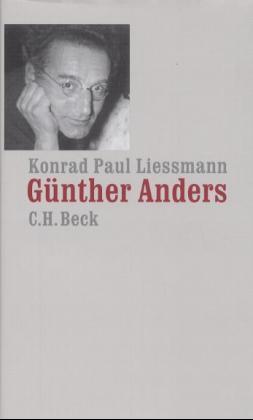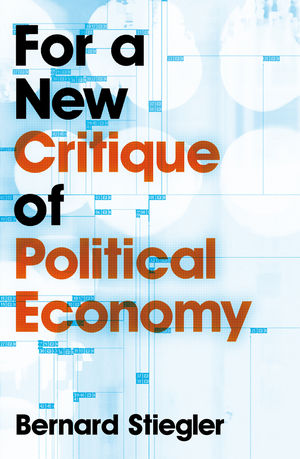Konrad Paul Liessmann: Günther Anders: philosophieren im Zeitalter der technologischen Revolutionen (2002) [German]
Filed under book | Tags: · contingency, critique, critique of technology, media theory, mobile technology, moral theory, nihilism, nuclear weapons, philosophy, philosophy of technology, technics, technology, totalitarianism

Konrad Paul Liessmann verdeutlicht in diesem Buch die außerordentliche Aktualität des Philosophen Günther Anders: Gerade angesichts der drängenden Fragen der Gegenwart – von den Biotechnologien über die Allgegenwart der Medien bis hin zu den Problemen von Gewalt, Terror und Krieg – erscheint die Philosophie von Günther Anders unverzichtbarer denn je. Günther Anders (1902 – 1992) war der vielleicht bedeutendste Philosoph der modernen technischen Zivilisation. Schon frühzeitig versuchte er sich dem Phänomen einer vollständig technisierten Welt zu stellen, wobei ihn vor allem das Verhältnis des Menschen zur von ihm selbst geschaffenen Technik interessierte. Anders diagnostizierte ein fundamentales “prometheisches” Gefälle zwischen dem unvollkommenen Menschen und seiner immer perfekter werdenden Technik, das ihn zu seiner vieldiskutierten These von der “Antiquiertheit des Menschen” führte. Alles andere als antiquiert ist hingegen die Philosophie von Günther Anders. Seine bahnbrechenden Analysen des Fernsehens erweisen erst im Zeitalter von Reality-TV und CNN-Nachrichten ihre eigentliche Relevanz und verblüffende Erklärungskraft, sein unerschütterlicher Kampf gegen totalitäre Systeme und die atomare Bedrohung ist gerade in einer Zeit hochaktuell, die offenbar vergessen hat, daß noch immer Tausende Atomsprengköpfe neben unzähligen B- und C-Waffen lagern, seine radikalen Reflexionen zu Auschwitz und Hiroshima können schon wieder als brisanter und provozierender Kommentar zur gegenwärtigen Erinnerungskultur gelesen werden, und seine Überlegungen zum Verhältnis von Moral und Technik könnten der gen- und bioethischen Diskussion der Gegenwart einige entscheidende Impulse geben.
Publisher C.H.Beck, 2002
ISBN 3406487203, 9783406487200
207 pages
, PDF (updated on 2014-12-22)
Comment (0)Andrew Feenberg: Alternative Modernity: The Technical Turn in Philosophy and Social Theory (1995)
Filed under book | Tags: · critique, modernity, philosophy, social theory, technics, technology

In this new collection of essays, Andrew Feenberg argues that conflicts over the design and organization of the technical systems that structure our society shape deep choices for the future. A pioneer in the philosophy of technology, Feenberg demonstrates the continuing vitality of the critical theory of the Frankfurt School. He calls into question the anti-technological stance commonly associated with its theoretical legacy and argues that technology contains potentialities that could be developed as the basis for an alternative form of modern society.
Feenberg’s critical reflections on the ideas of Jürgen Habermas, Herbert Marcuse, Jean-François Lyotard, and Kitaro Nishida shed new light on the philosophical study of technology and modernity. He contests the prevalent conception of technology as an unstoppable force responsive only to its own internal dynamic and politicizes the discussion of its social and cultural construction.
This argument is substantiated in a series of compelling and well-grounded case studies. Through his exploration of science fiction and film, AIDS research, the French experience with the “information superhighway,” and the Japanese reception of Western values, he demonstrates how technology, when subjected to public pressure and debate, can incorporate ethical and aesthetic values.
Publisher University of California Press, 1995
ISBN 0520089863, 9780520089860
251 pages
PDF (EPUB; updated on 2012-7-31)
Comment (0)Bernard Stiegler: For a New Critique of Political Economy (2010)
Filed under book | Tags: · consumption, critique, economy, labour, marxism, philosophy, political economy, politics, society, technics

“The catastrophic economic, social and political crisis of our time calls for a new and original critique of political economy – a rethinking of Marx’s project in the very different conditions of twenty-first century capitalism.
Stiegler argues that today the proletarian must be reconceptualized as the economic agent whose knowledge and memory are confiscated by machines. This new sense of the term ‘proletarian’ is best understood by reference to Plato’s critique of exteriorized memory. By bringing together Plato and Marx, Stiegler can show how a generalized proletarianization now encompasses not only the muscular system, as Marx saw it, but also the nervous system of the so-called creative workers in the information industries. The proletarians of the former are deprived of their practical know-how, whereas the latter are shorn of their theoretical practice, and both suffer from a confiscation of the very possibility of a genuine art of living.
But the mechanisms at work in this new and accentuated form of proletarianization are the very mechanisms that may spur a reversal of the process. Such a reversal would imply a crucial distinction between one’s life work, originating in otium (leisure devoted to the techniques of the self), and the job, consisting in a negotium (the negotiation and calculation, increasingly restricted to short-term expectations), leading to the necessity of a new conception of economic value.
This short text offers an excellent introduction to Stiegler’s work while at the same time representing a political call to arms in the face of a deepening economic and social crisis.”
Publisher Polity, 2010
ISBN 0745648045, 9780745648040
100 pages
PDF (updated on 2020-8-7)
Comment (0)
